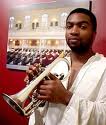Miles Davis is still at it — in Prospect Park, the Highline Ballroom, (le) Poisson Rouge, Carefusion Jazz Festival’s Carnegie Hall concerts, also overflowing the Montreal Museum of Fine Arts, as per my City Arts – New York column and enriching the glorious Festival International de Jazz de Montreal (June 25 – July 5).
Though he died of exacerbated living at age 65 in 1991, the influence of Miles’ trumpet and his breakthrough “directions in music” vibrates through urbane international cultural as strongly now as ever. Bitches Brew, which launched a jazz-rock revolution, and Tutu, his most ambitious late-period album, are inspiring high visibility concert performances that are exciting in their own rights, unveiling a potential future rather than reviving the past.
This Miles wave isn’t nostalgia-based: it’s a wake-up call for a world short on  sharp melodies, harmonic exploration, rampant rhythm, full-force interaction. Audiences I’ve encountered seem eager to hear again or for the first time Miles’ many modes — from aching fragility to hippest cool to surrealistic phantasmagoria to imperious swagger, all conveyed with surprising, original lyricism.
Miles’ direct heirs, sidemen and proteges including pianistHerbie Hancock (celebrating his 70th Birthday with a CareFusion Jazz Fest Carnegie gala June 24), Keith Jarrett, Jack DeJohnette, Marcus Miller, Dave Holland, Dave Liebman, Wayne Shorter, Ron Carter, Chick Corea, Mike Stern, John Scofield and John McLaughlin are firmly ensconced among jazz’s international elite. Somewhat further-removed acolytes are summoning Miles’ spirit, too. Miles is not just in the house, he’s in the air.
Last Friday night trumpeter Graham Haynes led Bitches Brew Revisited,

Graham Haynes, promotional photo, Discogs
with an intrepid all-star group at the free outdoor Celebrate Brooklyn series in the Prospect Park bandshell. Rather than a note-for-note reading, the performance was a re-opening and delving into a sonic vortex which seems just as roiling now as it was when recorded (sessions started the day after Woodstock, Miles determined to top Jimi Hendrix).
It is the orchestral sound, more than any one individual’s star turn, that distinguishes Bitches Brew, though each musician contributes significantly. In this version, Haynes echoed Miles’ haunting signature motifs and looped them; Antoine Roney trolled the deep using bass clarinet, sky-wrote with acid on soprano sax; James Blood Ulmer plucked spiky Delta blues-inflected guitar; keyboardist Marco Benevento mostly swept bejewelled Fender Rhodes fields, DJ Logic added samples and textures and clips from Miles’ interviews; Melvin Gibbs anchored everything; Adam Rudolph dealt hand percussion deftly in accord with Cindy Blackman who hit every surface of her drums rock hard with fierce speed. Each was audible, though a haze encompassed them all, for a mix somewhat muddier than that of the Bitches Brew 3-disc “collectors edition” umpteenth re-release scheduled for August 31.
A couple nights later, pianist Myra Melford’s Be Bread ensemble in its debut at (le) Poisson Rouge unexpectedly ventured into Davis territory. While Melford’s compositions often have the  oceanic sweep of open-ended Miles, she has seldom before so directly evoked the sonics of his early ’70s bands. Trumpeter Cuong Vu had a lot to do with it — his soloing with digital effects reaches areas Miles mostly only foresaw. But Melford’s deployment of a breath-activated electronic keyboard to approximate her last couple years’ accomplishments on harmonium, underscoring and oversoaring Ben Goldberg’s nervy clarinet, subtle touches added by guitarist Brandon Ross, deep pivot points planted by fretless bass guitarist Stomu Takehisi, Matt Wilson’s attentions and power on drums, led through Milesian territory on the way to quite unMilesean conclusions. Myra is an old friend of mine, so if you doubt my critical objectivity, check the record: The Whole Tree Gone.
Right now Marcus Miller’s Tutu, featuring trumpeter Christian Scott, is on tour — at the Highline Ballroom in NYC last night. When I saw them in Montreal last month for the opening of the large and popular We Want Miles museum exhibit, their performance was big fun. The music all by itself is something 20ish hipsters should really turn themselves onto ’cause it will be aces in their earbuds, but the musicians’ on-stage posing, too, was tailored, choreographed and lit like a cheeky fashion show. Scott, a New Orleans-born-and-raised trumpeter, channels MD’s post-acoustic horn style such that Wynton Marsalis might blanch.
Back to Graham Haynes: he’s taking Bitches Brew Revisited to Montreal this week, with Vernon Reid filling the guitar chair, James Hurt on keyboards and JT Lewis drumming, to launch a Miles booking concentration at the Montreal Jazz Fest. These are the fest’s other Miles’ related bookings:
- early ’80s MD band veteran guitarist Mike Stern (who opened for Haynes at Prospect Park with a rock-funk quartet so heavy it could only come from an oil-based economy),
- straighter-ahead trumpeter Wallace Roney’s Quintet,
- Norwegian hip-hop brassman Nils Petter Molvaer,
- trumpeter Ron Di Lauro playing the MD/Gil Evans version of Porgy and Bess,
- Dave Douglas with his electric sextet Keystone,
- Jack DeJohnette’s whiz-bang band with electric guitarist Dave Fiuczynski and alto saxophonist Rudresh Mahanthappa,
- pianist Ahmad Jamal,
- saxophonist Sonny Rollins,
- guitarist John Scofield,
- Polish trumpeter Tomasz Stanko,
- Keith Jarrett’s trio (with Jack DeJohnette, Gary Peacock),
- Cyndi (“Time After Time”) Lauper,
- George Clinton’s Parliament
- Christian Scott with his own quartet.
And there’s a nightly film series including Louis Malle’s thriller Ascenseur Pour L’Echafaud with Miles’ improvised score, several filmed MD concerts, and MD acting, sort of, in Dingo.
Miles appropriated whatever he could — new ideas, new technology, new talents, new muses — in pursuit of worldly success and, perhaps, artistic legacy. He realized the coolest, most compelling explorations of polyphonic, polyrhythmic, electro-acoustic, live-in-concert and studio-assembled, through-composed and highly improvised music in the second half of America’s 20th Century. Want a bracing listening experience? Something to shake things up, chill things out, make it new? Listen to Miles. It’s easy, he’s virtually everywhere.
howardmandel.com
Subscribe by Email |
Subscribe by RSS |
Follow on Twitter
All JBJ posts |
